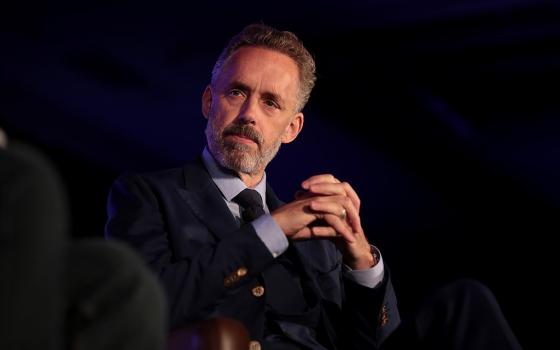Climate change activists in San Francisco paint a mural during a protest outside of BlackRock headquarters Oct. 29, 2021, ahead of the 2021 U.N. Climate Change Conference. (CNS/Reuters/Nathan Frandino)
Editor's Note: This article by Yale Climate Connections and is published here as part of the global journalism collaboration Covering Climate Now.
Farmers who can't sleep, worrying they'll lose everything amid increasing drought. Youth struggling with depression over a future that feels hopeless. Indigenous people grief-stricken over devastated ecosystems. For all these people and more, climate change is taking a clear toll on mental health — in every part of the world.
Experts shared these examples and others during a recent summit organized by the Connecting Climate Minds network that brought together hundreds of scientists, doctors, community leaders, and other experts from dozens of countries who have spent the past year studying how climate change is harming mental health in their regions.
Although mental illnesses are often viewed as an individual problem, the experts made clear that climate change is contributing to mental health challenges everywhere.
The Connecting Climate Minds youth ambassador from Borneo, Jhonatan Yuditya Pratama, said his Indigenous community views nature as a sacred extension of being. Seeing the devastation of climate change on ancestral lands has brought his community "a profound sense of grief and loss," he said.
"For us, mental health isn't just about individuals," he said. "It's about the collective well-being of our communities and the land itself. When nature suffers, so do we."
Extreme weather and air pollution are taking a toll
In her keynote, Marina Romanello, executive director of the Lancet Countdown and a Connecting Climate Minds advisory board member, explained the key ways that climate change threatens mental health.
- Extreme heat is associated with increased self-harm and violence as well as more general feelings of negativity. It also leads to feelings of isolation when people feel trapped inside their relatively cooler homes.
- Wildfire or extreme weather stokes anxiety leading up to an event — and afterward — that can lead to PTSD or depression for survivors who have seen cherished places or lives lost.
- Farmers, fisherpeople and others whose livelihoods are tied to the environment experience chronic stress, worry and depression over things they can't control, like extreme weather, habitat loss and drought.
- Water scarcity increases stress for people in charge of seeking and transporting household water. Water scarcity also makes it hard for people to stay clean, potentially leading to isolation, loneliness and depression.
- Air pollution can keep kids out of school, leading to social isolation and, over time, a sense of hopelessness about the future.
Advertisement
What's more, people are experiencing the compounding effects of multiple disasters, said Emma Lawrance, who leads the Climate Cares Centre, a U.K.-based team that researches and supports mental health in the face of environmental crises: "With more frequent disasters, people can no longer recover psychologically from one before another occurs," Lawrance said.
And these escalating hazards are exacerbating social inequality, said Alaa Abelgawad, the Connecting Climate Minds youth ambassador representing northern Africa and western Asia. "[It's] manifesting as anxiety, depression, and a profound sense of disempowerment among marginalized populations."
Who is most vulnerable to climate change and mental health challenges?
Many Indigenous communities have already been facing intergenerational trauma and a sense of deep disconnect from land and culture. Recurring climate devastation can intensify feelings of grief, stress and disillusionment about the future, contributing to increased rates of addiction and suicide, participants said.
Farmers, too, are among the most vulnerable. Changing seasonal norms, increasing drought and a higher risk of severe weather are directly affecting their livelihoods.
Sacha Wright, head of research at the youth-focused organization Force of Nature and part of Connecting Climate Minds's "lived experience" working group, said that in Kenya, many small farmers are struggling with declining harvests and out of desperation have resorted to cutting down trees for charcoal. Though they felt they had no choice, some said cutting down the trees made the whole situation feel even worse. She spoke of high rates of depression, hopelessness, trauma and a widespread feeling of "not knowing what to do."
For young people, climate change can also evoke a sense of hopelessness and powerlessness. In the Yucatan, one young person Wright interviewed said the only choices in life there are to migrate or enter the military.
"When I see drought, I see my community leaving school and going to the military," the person interviewed said.
Mercy Njeru, a member of Connecting Climate Mind's sub-Saharan Africa working group, said extreme heat is often leading to school closures across the region, setting youth up for failure and a sense of hopelessness.
"When it's so hot and you're so anxious you can't work, you can't do anything because you're feeling anxious or you're feeling so sad from all the heat around you," she said.
In addition to environmental impacts, generational inequity and a sense of moral distress also contribute to anxiety for many youth. Britt Wray, director of Stanford Medicine's Special Initiative on Climate Change and Mental Health, said she hears from many young people that power holders aren't taking sufficient action, instead depending entirely on their generation to solve climate change.
"This offloading of responsibility — without adequate partnership from the elder and more powerful contingents among us — can make burdensome climate anxiety and distress much worse," she said.
What can be done to protect mental health as the climate changes?
To help address the rising tide of mental health challenges, governments and public health leaders need to know exactly what kinds of impacts people are experiencing in their own communities.
First step: looking at experiences in every region.
"We will only be successful if we can continue to connect and engage people from very different sectors, from neighborhoods all the way to multilateral organizations," said Pamela Collins, chair of the department of mental health at the Johns Hopkins Bloomberg School of Public Health.
Other examples of ways forward include everything from expanding health insurance to include climate-related mental health impacts to ensuring government policy supports people whose work has been affected by climate change to improve their job prospects. Several participants also spoke of the importance of returning to the wisdom of ancestral knowledge to address climate change in general, including mental health impacts.
Other specific solutions offered by Connecting Climate Minds participants include:
- More public green space. Collins, the Hopkins professor, cited a study highlighting the need for more accessible green space in cities, a move that could have multiple positive outcomes, including on mental health. Forest bathing, AKA spending dedicated time in nature, reduces stress and anxiety, increases serotonin production and improves mood regulation and overall mental health — all while being low-intensity and low-cost, said Niaya Harper Igarashi, part of Connecting Climate Mind's eastern and southeastern Asia working group.
- Focusing on reducing inequity. Making sure everyone has access to nutritious food, clean air and water and sustainable energy sources is good for the climate and community.
- Talking helps. In many communities, mental health is a taboo topic. By talking more openly about it on a personal level, in social or spiritual settings, at the dinner table, or in your doctor's office, individuals can combat stigma and contribute to a growing understanding of these issues.
- Meeting people where they are. From using vocabulary that makes sense for different communities to meeting people's basic needs, solutions are most effective when they're tailored for what real people are actually going through. For example, Wray, the Stanford expert, said meeting kids where they are includes screening for climate distress where many of them are every day: at school.
Lawrance, the Climate Cares lead who helped organize the summit, said it was heartening to see solutions being advanced around the world.
"The dialogue showed this really strongly: that many solutions do already exist," she said. "And it's by learning from each other's ways of knowing and doing that we can best find the ones that work for our context, and ensure people experiencing the worst climate impacts have a future where they cannot just survive, but thrive."





